112 scholarly books by Bucknell University Press and 11
have author last names that start with M
112 scholarly books by Bucknell University Press and 11
112 scholarly books by Bucknell University Press
11 have author last names that start with M have author last names that start with M
11 have author last names that start with M have author last names that start with M
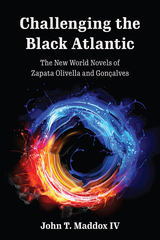
Challenging the Black Atlantic
The New World Novels of Zapata Olivella and Gonçalves
John T. Maddox IV
Bucknell University Press, 2021
The historical novels of Manuel Zapata Olivella and Ana Maria Gonçalves map black journeys from Africa to the Americas in a way that challenges the Black Atlantic paradigm that has become synonymous with cosmopolitan African diaspora studies. Unlike Paul Gilroy, who coined the term and based it on W.E.B. DuBois’s double consciousness, Zapata, in Changó el gran putas (1983), creates an empowering mythology that reframes black resistance in Colombia, Haiti, Mexico, Brazil, and the United States. In Um defeito de cor (2006), Gonçalves imagines the survival strategies of a legendary woman said to be the mother of black abolitionist poet Luís Gama and a conspirator in an African Muslim–led revolt in Brazil’s “Black Rome.” These novels show differing visions of revolution, black community, femininity, sexuality, and captivity. They skillfully reveal how events preceding the UNESCO Decade of Afro-Descent (2015–2024) alter our understanding of Afro-Latin America as it gains increased visibility.
Published by Bucknell University Press. Distributed worldwide by Rutgers University Press.
Published by Bucknell University Press. Distributed worldwide by Rutgers University Press.
[more]
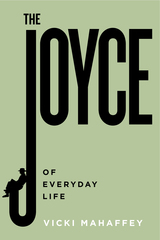
The Joyce of Everyday Life
Vicki Mahaffey
Bucknell University Press, 2025
Part of James Joyce’s genius was his ability to find the poetry in everyday life. For Joyce, even a simple object like a table becomes magical, “a board that was of the birchwood of Finlandy and it was upheld by four dwarfmen of that country but they durst not move more for enchantment.” How might we learn to regain some of the child-like play with language and sense of delight in the ordinary that comes so naturally to Joyce?
The Joyce of Everyday Life teaches us how to interpret seemingly mundane objects and encounters with openness and active curiosity in order to attain greater self-understanding and a fuller appreciation of others. Through a close examination of Joyce's joyous, musical prose, it shows how language provides us with the means to revitalize daily experience and social interactions across a huge, diverse, everchanging world.
Acclaimed Joyce scholar Vicki Mahaffey demonstrates how his writing might prompt us to engage in a different kind of reading, treating words and fiction as tools for expanding the boundaries of the self with humor and feeling. A book for everyone who loves language, The Joyce of Everyday Life is a lyrical romp through quotidian existence.
The Joyce of Everyday Life teaches us how to interpret seemingly mundane objects and encounters with openness and active curiosity in order to attain greater self-understanding and a fuller appreciation of others. Through a close examination of Joyce's joyous, musical prose, it shows how language provides us with the means to revitalize daily experience and social interactions across a huge, diverse, everchanging world.
Acclaimed Joyce scholar Vicki Mahaffey demonstrates how his writing might prompt us to engage in a different kind of reading, treating words and fiction as tools for expanding the boundaries of the self with humor and feeling. A book for everyone who loves language, The Joyce of Everyday Life is a lyrical romp through quotidian existence.
[more]
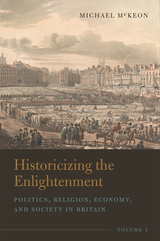
Historicizing the Enlightenment, Volume 1
Politics, Religion, Economy, and Society in Britain
Michael McKeon
Bucknell University Press, 2023
The Enlightenment has been blamed for some of the most deadly developments of modern life: racism and white supremacy, imperialist oppression, capitalist exploitation, neoliberal economics, scientific positivism, totalitarian rule. These developments are thought to have grown from principles that are rooted in the soil of the Enlightenment: abstraction, reduction, objectification, quantification, division, universalization. Michael McKeon’s new book corrects this defective view by historicizing the Enlightenment--by showing that the Enlightenment has been abstracted from its history. From its past: critics have ignored that Enlightenment thought is a reaction against deadly traditions that precede it. From its present: the Enlightenment extended its reactive analysis of the past to its own present through self-analysis and self-criticism. From its future: much of what’s been blamed amounts to the failure of its posterity to sustain Enlightenment principles. To historicize the Enlightenment requires that we conjure what it was like to live through the emergence of concepts and practices that are now commonplace—society, privacy, the public, the market, experiment, secularity, representative democracy, human rights, social class, sex and gender, fiction, the aesthetic attitude. McKeon’s book argues the continuity of Enlightenment thought, its consistency and integrity across this broad range of conceptual domains. It also shows how the Enlightenment has shaped our views of both tradition and modernity, and the revisionary work that needs to be done in order to understand our place in the future. In the process, Historicizing the Enlightenment exemplifies a distinctive historiography and historical method.
Published by Bucknell University Press. Distributed worldwide by Rutgers University Press.
Published by Bucknell University Press. Distributed worldwide by Rutgers University Press.
[more]
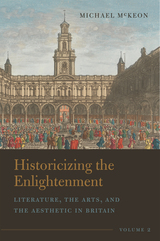
Historicizing the Enlightenment, Volume 2
Literature, the Arts, and the Aesthetic in Britain
Michael McKeon
Bucknell University Press, 2023
Enlightenment critics from Dryden through Johnson and Wordsworth conceived the modern view that art and especially literature entails a double reflection: a reflection of the world, and a reflection on the process by which that reflection is accomplished. Instead “neoclassicism” and “Augustanism” have been falsely construed as involving a one-dimensional imitation of classical texts and an unselfconscious representation of the world. In fact these Enlightenment movements adopted an oblique perspective that registers the distance between past tradition and its present reenactment, between representation and presence. Two modern movements, Romanticism and modernism, have appropriated as their own these innovations, which derive from Enlightenment thought. Both of these movements ground their error in a misreading of “imitation” as understood by Aristotle and his Enlightenment proponents. Rightly understood, neoclassical imitation, constitutively aware of the difference between what it knows and how it knows it, is an experimental inquiry that generates a range of prefixes—“counter-,” “mock-,” “anti-,” “neo-”—that mark formal degrees of its epistemological detachment. Romantic ideology has denied the role of the imagination in Enlightenment imitation, imposing on the eighteenth century a dichotomous periodization: duplication versus imagination, the mirror versus the lamp. Structuralist ideology has dichotomized narration and description, form and content, structure and history. Poststructuralist ideology has propounded for the novel a contradictory “novel tradition”—realism, modernism, postmodernism, postcolonialism—whose stages both constitute a sequence and collapse it, each stage claiming the innovation of the stage that precedes it.
Published by Bucknell University Press. Distributed worldwide by Rutgers University Press.
Published by Bucknell University Press. Distributed worldwide by Rutgers University Press.
[more]
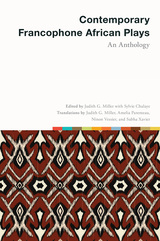
Contemporary Francophone African Plays
An Anthology
Judith G. Miller
Bucknell University Press, 2024
Bringing together in English translation eleven Francophone African plays dating from 1970 to 2021, this essential collection includes satirical portraits of colonizers and their collaborators (Bernard Dadié’s Béatrice du Congo; Sony Labou Tansi’s I, Undersigned, Cardiac Case; Sénouvo Agbota Zinsou’s We’re Just Playing) alongside contemporary works questioning diasporic identity and cultural connections (Koffi Kwahulé’s SAMO: A Tribute to Basquiat and Penda Diouf’s Tracks, Trails, and Traces…). The anthology memorializes the Rwandan genocide (Yolande Mukagasana’s testimony from Rwanda 94), questions the status of women in entrenched patriarchy (Werewere Liking’s Singuè Mura: Given That a Woman…), and follows the life of Elizabeth Nietzsche, who perverted her brother’s thought to colonize Paraguay (José Pliya’s The Sister of Zarathustra). Gustave Akakpo’s The True Story of Little Red Riding Hood and Kossi Éfoui’s The Conference of the Dogs offer parables about what makes life livable, while Kangni Alem’s The Landing shows the dangers of believing in a better life, through migration, outside of Africa.
[more]
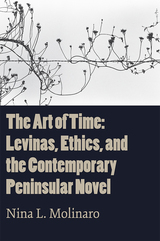
The Art of Time
Levinas, Ethics, and the Contemporary Peninsular Novel
Nina L Molinaro
Bucknell University Press, 2019
Ethics, or the systematized set of inquiries and responses to the question “what should I do?” has infused the history of human narrative for more than two centuries. One of the foremost theorists of ethics during the twentieth century, Emmanuel Levinas (1906-1995) radicalized the discipline of philosophy by arguing that “the ethical” is the foundational moment for human subjectivity, and that human subjectivity underlies all of Western philosophy. Levinas’s voice is crucial to the resurging global attention to ethics because he grapples with the quintessential problem of alterity or “otherness,” which he conceptualizes as the articulation of, and prior responsibility to, difference in relation to the competing movement toward sameness.
Academicians and journalists in Spain and abroad have recently fastened on an emerging cluster of peninsular writers who, they argue, pertain to a discernible literary generation, provisionally referred to as Generación X. These writers are distinct from their predecessors; they and their literary texts are closely related to the specific socio-political and historical circumstances in Spain and their novels relate stories of more and less proximity, more and less responsibility, and more and less temporality. In short, they trace the temporal movement of alterity through narrative.
Published by Bucknell University Press. Distributed worldwide by Rutgers University Press.
Academicians and journalists in Spain and abroad have recently fastened on an emerging cluster of peninsular writers who, they argue, pertain to a discernible literary generation, provisionally referred to as Generación X. These writers are distinct from their predecessors; they and their literary texts are closely related to the specific socio-political and historical circumstances in Spain and their novels relate stories of more and less proximity, more and less responsibility, and more and less temporality. In short, they trace the temporal movement of alterity through narrative.
Published by Bucknell University Press. Distributed worldwide by Rutgers University Press.
[more]
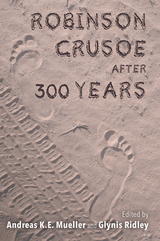
Robinson Crusoe after 300 Years
Andreas K. E. Mueller
Bucknell University Press, 2021
There is no shortage of explanations for the longevity of Defoe’s Robinson Crusoe, which has been interpreted as both religious allegory and frontier myth, with Crusoe seen as an example of the self-sufficient adventurer and the archetypal colonizer and capitalist. Defoe’s original has been reimagined multiple times in legions of Robinsonade or castaway stories, but the Crusoe myth is far from spent. This wideranging collection brings together eleven scholars who suggest new and unfamiliar ways of thinking about this most familiar of works, and who ask us to consider the enduring appeal of “Crusoe,” more recognizable today than ever before.
[more]
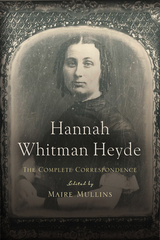
Hannah Whitman Heyde
The Complete Correspondence
Maire Mullins
Bucknell University Press, 2022
The correspondence of Hannah Whitman Heyde (1823-1908), younger sister of poet Walt Whitman, provides a rare glimpse into the life of a nineteenth-century woman. Married to well-known Vermont landscape artist Charles Louis Heyde (1820-1892), Hannah documented in letters to her mother, Louisa Van Velsor Whitman (1795-1873), and other family members, her lived experience of ongoing physical and emotional abuse at the hands of her husband. Hannah has long been characterized in biographical and scholarly studies of Whitman’s family as a neurotic and a hypochondriac—a narrative promulgated by Heyde himself—but Walt Whitman carefully preserved his sister’s letters, telling his literary biographer that his intention was to document her plight. Hannah’s complete letters, gathered here for the first time and painstakingly edited and annotated by Maire Mullins, provide an important counternarrative, allowing readers insight into the life of a real nineteenth-century woman, sister, and wife to famous men, who endured and eventually survived domestic violence.
[more]
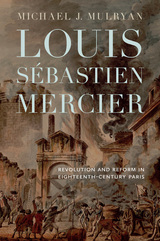
Louis Sébastien Mercier
Revolution and Reform in Eighteenth-Century Paris
Michael J. Mulryan
Bucknell University Press, 2023
French playwright, novelist, activist, and journalist Louis Sébastien Mercier (1740–1814) passionately captured scenes of social injustice in pre-Revolutionary Paris in his prolific oeuvre but today remains an understudied writer. In this penetrating study—the first in English devoted to Mercier in decades—Michael Mulryan explores his unpublished writings and urban chronicles, Tableau de Paris (1781–88) and Le Nouveau Paris (1798), in which he identified the city as a microcosm of national societal problems, detailed the conditions of the laboring poor, encouraged educational reform, and confronted universal social ills. Mercier’s rich writings speak powerfully to the sociopolitical problems that continue to afflict us as political leaders manipulate public debate and encourage absolutist thinking, deepening social divides. An outcast for his polemical views during his lifetime, Mercier has been called the founder of modern urban discourse, and his work a precursor to investigative journalism. This sensitive study returns him to his rightful place among Enlightenment thinkers.
[more]
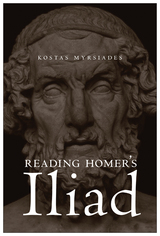
Reading Homer's Iliad
Kostas Myrsiades
Bucknell University Press, 2023
We still read Homer’s epic the Iliad two-and-one-half millennia since its emergence for the questions it poses and the answers it provides for our age, as viable today as they were in Homer’s own times. What is worth dying for? What is the meaning of honor and fame? What are the consequences of intense emotion and violence? What does recognition of one’s mortality teach? We also turn to Homer’s Iliad in the twenty-first century for the poet’s preoccupation with the essence of human life. His emphasis on human understanding of mortality, his celebration of the human mind, and his focus on human striving after consciousness and identity has led audiences to this epic generation after generation. This study is a book-by-book commentary on the epic’s 24 parts, meant to inform students new to the work. Endnotes clarify and elaborate on myths that Homer leaves unfinished, explain terms and phrases, and provide background information. The volume concludes with a general bibliography of work on the Iliad, in addition to bibliographies accompanying each book’s commentary.
[more]
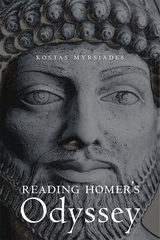
Reading Homer’s Odyssey
Kostas Myrsiades
Bucknell University Press, 2019
Finalist for the 2020 PROSE Awards, Classics section
Homer’s Odyssey is the first great travel narrative in Western culture. A compelling tale about the consequences of war, and about redemption, transformation, and the search for home, the Odyssey continues to be studied in universities and schools, and to be read and referred to by ordinary readers. Reading Homer’s Odyssey offers a book-by-book commentary on the epic’s themes that informs the non-specialist and engages the seasoned reader in new perspectives. Among the themes discussed are hospitality, survival, wealth, reputation and immortality, the Olympian gods, self-reliance and community, civility, behavior, etiquette and technology, ease, inactivity and stagnation, Penelope’s relationship with Odysseus, Telemachus’ journey, Odysseus’ rejection of Calypso’s offer of immortality, Odysseus’ lies, Homer’s use of the House of Atreus and other myths, the cinematic qualities of the epic’s structure, women’s role in the epic, and the Odyssey’s true ending. Footnotes clarify and elaborate upon myths that Homer leaves unfinished, explain terms and phrases, and provide background information. The volume concludes with a general bibliography of work on the Odyssey, in addition to the bibliographies that accompany each book’s commentary.
Published by Bucknell University Press. Distributed worldwide by Rutgers University Press.
Homer’s Odyssey is the first great travel narrative in Western culture. A compelling tale about the consequences of war, and about redemption, transformation, and the search for home, the Odyssey continues to be studied in universities and schools, and to be read and referred to by ordinary readers. Reading Homer’s Odyssey offers a book-by-book commentary on the epic’s themes that informs the non-specialist and engages the seasoned reader in new perspectives. Among the themes discussed are hospitality, survival, wealth, reputation and immortality, the Olympian gods, self-reliance and community, civility, behavior, etiquette and technology, ease, inactivity and stagnation, Penelope’s relationship with Odysseus, Telemachus’ journey, Odysseus’ rejection of Calypso’s offer of immortality, Odysseus’ lies, Homer’s use of the House of Atreus and other myths, the cinematic qualities of the epic’s structure, women’s role in the epic, and the Odyssey’s true ending. Footnotes clarify and elaborate upon myths that Homer leaves unfinished, explain terms and phrases, and provide background information. The volume concludes with a general bibliography of work on the Odyssey, in addition to the bibliographies that accompany each book’s commentary.
Published by Bucknell University Press. Distributed worldwide by Rutgers University Press.
[more]
READERS
Browse our collection.
PUBLISHERS
See BiblioVault's publisher services.
STUDENT SERVICES
Files for college accessibility offices.
UChicago Accessibility Resources
home | accessibility | search | about | contact us
BiblioVault ® 2001 - 2024
The University of Chicago Press









